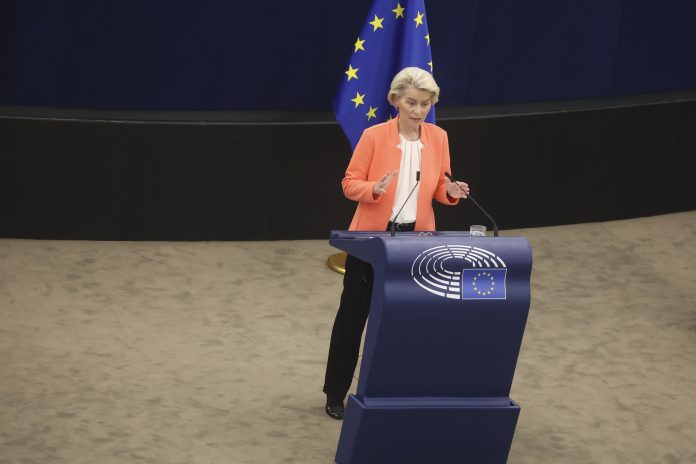Yesterday’s State of the Union address by European Commission President Ursula von der Leyen is a salutary time to review just how the legislative and policy initiatives she proposed in her annual address a year ago fared in the ensuing 12 months.
While Russia’s war on Ukraine was the priority, the energy crisis, the economy, fiscal rules, trade deals, corruption, migration and the defence of democracy also figured prominently.
Von der Leyen vowed to sustain EU military equipment supplies and financial assistance to help Ukraine face Moscow’s onslaught and the war’s fallout. Yet the Commission’s initial proposal of an €18-billion financial aid package to bolster Kyiv’s budget across 2023 could not be approved until Hungary lifted its veto.
Later, the EC unveiled a €50-billion mix of grants and loans to provide long-term financial assistance, but this remains subject to negotiations and is linked to finalisation of the bloc’s multiannual budget.
True, the EU did more than double its military support for Ukraine under the European Peace Facility (EPF) — from €2.5 billion to €5.6 billion — and it fast-tracked a €500-million industrial plan to ramp up production of artillery shells.
Closer ties with Ukraine
Von der Leyen declared the Commission would bring Ukraine into the European free-roaming area, while granting it “seamless access” to the single market.
The EC adopted a proposal in February to facilitate the former, but, since Kyiv has still to properly align its legal framework, free roaming is not yet in place, although the price of calls has been reduced.
As for granting access to the single market, the opposite occurred. Poland, Hungary, Slovakia, Romania and Bulgaria complained that tariff-free cereals were lowering prices for local farmers, which led to the EU imposing temporary bans on Ukrainian grain. The grain controversy remains unresolved.
Sanctions here to stay
Von der Leyen made it clear to MEPs that the EU would continue with sanctions to curb the Kremlin’s ability to wage war against Ukraine. An extra four rounds of sanctions were imposed on Russia, making for a total of eleven in all. By early December, the EU, along with the G7 and Australia, had put a price cap on the maritime trade of Russian crude oil and refined products (among the Kremlin’s main sources of revenue).
Brussels also took steps to block sanctions’ avoidance detected in trade links between Russia and countries like the United Arab Emirates, Turkey, Kazakhstan, Uzbekistan and Armenia. Three China-based companies were also blacklisted. However, promised sanctions against Russian diamonds have yet to materialise.
A hard-to-quit dependency
While the EU managed to wean itself off Russian coal and Russian seaborne oil, Russian gas continued to flow into the bloc, notably in the form of liquefied natural gas (LNG). Just last month, the EU was revealed to be the leading client for Russian LNG, ahead of China. Purchases by Spain, Belgium and France were singled out. Despite this, gas imports from Russia accounted for less in 15% of total EU gas imports in the first half of 2023, compared to 45% in 2021.
Reducing influence of gas on electricity pricing
Von der Leyen declared the need “to decouple the dominant influence of gas on the price of electricity” and promised “reform of the electricity market” in last year’s State of the Union address.
However, as gas prices returned to tolerable levels, the impulse to interfere with the dynamics of marginal pricing disappeared. So, when the EC did unveil its reform plan in March, there was no mention of decoupling. Instead, the review opted to rely on long-term contracts to increase predictability and stability in prices.
Proposed fund downgraded
To make for a more self-sufficient and resilient EU, von der Leyen called for a “European Critical Raw Materials Act” to decrease the bloc’s reliance on foreign suppliers of the rare earths needed for the digital and green transition, and for a “European Sovereignty Fund” to finance cutting-edge technology-based domestic projects.
The former remains the subject of positive negotiations between member states and the European Parliament. However, a majority of member states opposed the issuance of fresh EU debt to establish the sovereignty fund. Instead, it was turned into the Strategic Technologies European Platform (STEP), a €10-billion envelope within the review of the bloc’s multi-annual budget.
NGOs oppose democracy defence proposal
Also, in her last State of the Union address, von der Leyen announced that she intended presenting “a Defence of Democracy package” designed to prevent “any autocracy’s Trojan horses” from attacking “our democracies from within.”
In the year since, the only sign of the promised package has been a posting on the Commission’s website that the executive is currently examining feedback obtained during the February-April consultation period.
In fact, von der Leyen’s idea of bringing “shady funding to light” set off alarm bells and outrage across the NGO world. In May, Transparency International, Human Rights Watch and Amnesty International were among more than 200 organisations to publicly condemn a proposal that would require commercial and non-profit organisations to disclose foreign funding. This, they argued, could only embolden repressive governments to silence civil society.
For its part, the EC continues to insist that the legislation was never meant to curtail activities but, rather, was being drafted to promote “common transparency standards.”

